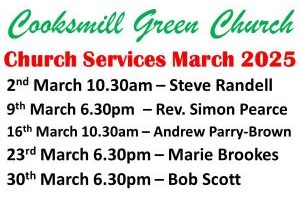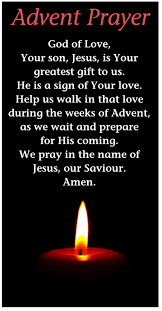Thought for The Month – Advent – December 2024
Happy New Church Year! Yes, it’s that time again as we leave one worship year for another, and as always, it must mean we have entered the season of Advent, which just like its Lenten cousin, calls upon us to make an effort to physically bring ourselves to a halt, to somehow put everything that life demands of us on hold, and create both space and time for some meaningful spiritual contemplation, based on the past, present and future presence of Christ, both in our lives and in the world around us.
The difficulty that the Advent observance has, much like the Lenten one, is that it’s competing with so many other seasonal secular preparations, which are of course time-consuming distractions, and that can mean that sometimes we really do struggle to simply come to a stop, let alone find time to reflect or prepare for the Advent Christ in our lives.
Advent is not Christmas, obviously, but secular Christmas is already so very much underway and feels to me like it’s devouring the spiritual purpose of Advent for us as Christians, and so the meaning of preparation in Advent, has become significantly marginalised by the preparation found in that question you are bound to be asked, “are you ready for Christmas?”. Maybe when it is asked of you, that word ‘ready’ will resonate within you on a far deeper and more spiritual level, before you answer for the secular.
So therein lies your first thought for today, which is to ask yourself, when and how will you set some time aside, to stop and think of what Advent means to you?
Scripture as always will give us the inspiration for reflection and preparation, our selected Advent readings will as always build a sense of expectation about the arrival of a saviour, the long-awaited Messiah that will bring justice and salvation into a world that feels broken and with its people lost. We find ourselves listening to a narrative of anticipation for a God that will bring about a better world, one of safety from persecution, free from poverty, devoid of conflict, a fair and just world for all peoples of all nations. It is a narrative of redeeming expectation set in the distant past, but one that we still desperately yearn for in the here and now, its relevance sadly never wanes, a narrative that gives purpose to both our persistent waiting and sense of hope for a future arrival, one that will set the world to rights. Advent is all about expectation, of a promise to return, and being ready when it does.
Expectations though should always be tempered with caution, because everything feels rosy if they eventually fulfil the purpose for having them, but think about how you feel when they don’t actually materialise in the way you had hoped? It would only be natural to have felt emotions such as disappointment, anger or doubt, which in turn might cause you to feel very disillusioned by the experience? A perfect example of this is found in one of the central figures of the Advent story, that of John the Baptist. Now here is someone who resolutely knew that the Messiah, the Savour of all, had arrived in a world that desperately needed Him, and not only that, but he also knew exactly who it was, having no doubts at all when declaring Jesus to be that very person. Unfortunately, John, like those around him, had a very fixed expectation of what the Messiah would be, a leader who would vanquish the oppressors of his people, forcefully set all the wrongs to right and would impose His heavenly will in order to get His way, everything that Jesus was never going to be. Skip a little further into his story and you will find John languishing in a prison cell, waiting for the spectacular release that never came, and when all the doubt and disappointment came bursting forth from the greatest of prophets, it led John to ask Jesus “are you the one or is there another”? The doubt and disappointment caused by his fixed expectations, was so powerful as to actually overwhelm his most stoic of faith. If it can happen to him, then what of us and our own expectations of Christ?
Well in this season of preparation for an arrival, being called to be watchful and ready, within an atmosphere of building anticipation, we might indeed, as individuals, ask what our own expectations of God are in the here and now, and like John, what might they be for the future? When Christ comes again as promised, what is it that you would be expecting? Would you, like John the Baptist, be able to recognise Him, would He meet your own expectations, would you also be looking for the spectacular and would you come to doubt Him if it were not so? I suppose like John it depends on what you imagine Him to be. As you take time to reflect, consider just how fixed are your expectations of God, and are they in fact actually limiting your experience of Him in the world right now? Jesus sent a message back to John to tell him to not look for the expected spectacular, but to open his eyes and look at what was actually happening around him, the world may appear broken, but because of the compassionate love being spread through the ministry of Jesus, people are being healed, loved, comforted and given hope. He wanted John to see that there is already an existing power within us all to make change, which is rooted in love and can be equally spectacular in its results.
Well, there you have a few thoughts for you to start off your Advent journey, hopefully a little challenging, hopefully a little reassuring too, comforting in that God is always with us, sometimes in the most simplest of form, so let’s not constrain His presence through fixed expectations of the spectacular, but look for Him, as we should always look for Him, amongst the good things that still happen around us, in the faces and actions of those who show us love and friendship, those who make unselfish sacrifices for others, for the blessings that we do have and not the ones we cry out for. Stop, reflect and prepare.
To all whom these words reach, I truly wish you an enlightening Advent, a peaceful Christmas and a very hopeful 2025. Whatever your circumstances may be, know that the love of God is always present, even if sometimes it’s hard to see. Amen.
Danny





